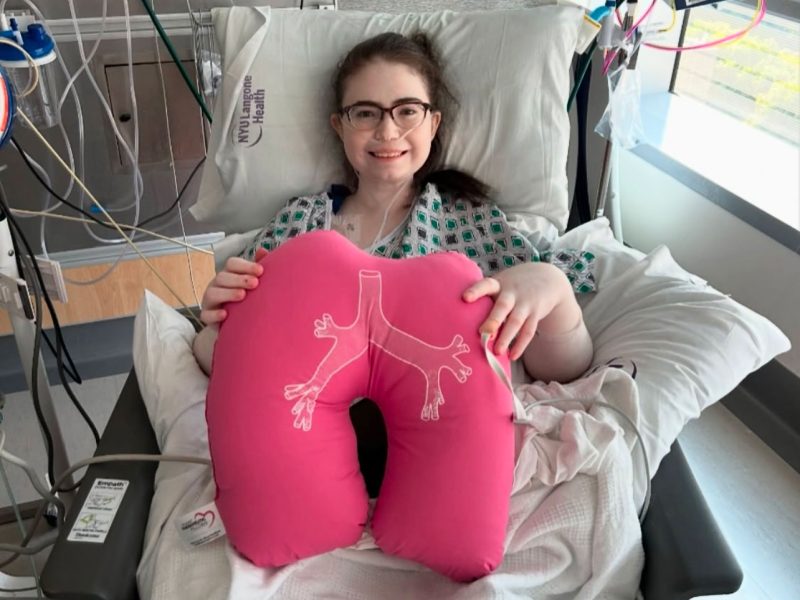Like many young women, Jen Dunlea loves listening to Chappell Roan, belting out tunes in the shower, sharing her life on social media, and experimenting with beauty products. She’s bubbly, articulate, and has a fantastic sense of humor. In many ways, she’s a typical 23-year-old with dreams far bigger than her petite frame—until she reveals exactly what those dreams are.
“I’m going to be the Oprah of sick kids,” Jen declares with a grin. “I’d love to create TV shows, podcasts, and books that don’t make jokes about organ donation and where sick people aren’t one-dimensional. I want kids with chronic illnesses to see themselves in the media—to feel inspired and understood.”
Jen knows firsthand what it’s like to grow up feeling isolated. Diagnosed with Cystic Fibrosis (CF) as a toddler, she received her first double-lung transplant at just 13 years old.
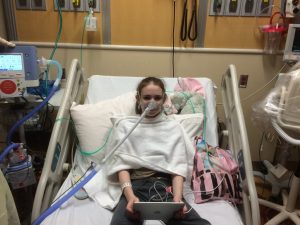
“With CF, you can’t be around others with CF, so it’s a very lonely disease,” she explains. “I always wished for someone who truly understood what I was going through.”
Despite health struggles, she navigated high school with resilience, facing transplant-related diabetes and even a rare cancer, PTLD, which she overcame in her junior year. Before graduating in 2020, a familiar threat returned-a dangerous bacterial infection for CF patients.
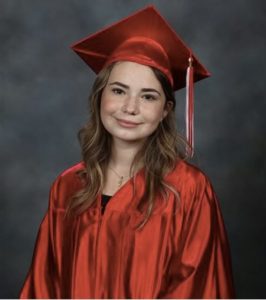
“It was harder to treat than the previous infection, and we were all very scared,” Jen recalls. “We tried very harsh meds and threw everything at it. Eventually, the medicine overran my kidneys and liver and everything just stopped working. I was in so much pain, but they couldn’t give me pain meds. It was terrible.”
The medications triggered a neurological condition, PRES, forcing Jen to relearn how to walk and talk. She also temporarily lost her short-term memory—not recognizing her mother and forgetting her dog’s name. Only a few short months after she fully recovered, she was diagnosed with chronic organ rejection.
Jen thinks, “The PRES was like a restart button in my body saying ‘hey, this doesn’t belong here, let’s attack it,’” she says. “Chronic rejection are the two words you never want to hear if you’ve had a transplant.”
Half of chronic rejection patients develop BOS (Bronchiolitis Obliterans Syndrome), a progressive and incurable lung disease. Jen turned to photopheresis, one of the few available treatments, and plateaued for four years. But the reality was unavoidable—she needed another transplant.
For three years, she and her mother searched for a center willing to take on her high-risk redo double lung transplant case.
“My old transplant pulmonologist was so dedicated,” Jen says. “He sent my info across the U.S., but I kept getting denied. I had a stent in my pulmonary artery, and the scar tissue made me a difficult case. A transplant like this had never been done before.”
Then, after reading about NYU’s transplant program, Jen and her mom drove from Philadelphia to New York, hoping for a different answer.
“I met the team, and the doctor said, ‘My goal is to get you these lungs and keep you running for 20 years,’” she says. “It was such a stark contrast to everything I’d heard before.”
Her surgeon, Dr. Chang, didn’t hesitate.
“She looked at my case and said, ‘yes, I can do this,’” Jen recalls. “I had scared every other transplant team in the country, but they were confident—and I was confident in them.”
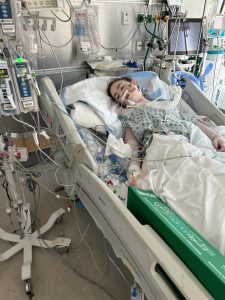
Jen, who after four years of no’s became “a walking yes,” received her second lifesaving transplant by direct donation on Aug. 19, 2024—thanks, in part, to the FBI. Yes, you read that right.
“My mom’s sorority sister, Bridgit, has a son in the FBI who had heard that someone had passed away during training and the family wanted to directly donate organs to someone within the FBI family,” says Jen. “Bridgit immediately thought of me and called my mom.”
Connections were made, approvals were granted, and the NYU transplant team retrieved the lungs from Virginia.
“The funny thing is, I’ve been obsessed with the FBI since I was 10,” Jen says, laughing. “I even used to fingerprint my nurses in the hospital. My step-uncle was an FBI agent, and I always thought, ‘That’s who I want to be!’ I may never run fast enough to an agent, but this feels like my way in. It’s another cosmic connection between me and my donor.”
Jen only knows that her donor was a young cadet, but she’s been told their family is open to connecting.
“I wrote my donor letter in under an hour because I’d been writing it in my head for five months,” she says. “I hope it brings them comfort. Their loved one’s legacy lives on with me.”
Now, Jen is using her second chance to advocate for organ donation and those with chronic illnesses. Her TikTok and Instagram (@jencantbreathe) have become platforms for education, humor, and hope.
“My whole journey with social media actually started in the hospital room when I was getting ready for my transplant,” says Jen. “The song Hot to Go was trending on TikTok, so I filmed this video with the dance before going into surgery. A few days later, my dad told me my post went viral. I couldn’t believe that people actually cared about what I was saying! All these strangers were rooting for me, and I even got a comment from the American Lung Association saying, ‘you got this!’ That’s when I realized—I need to share everything I know about CF and transplant.”

In her letter to her donor’s family, Jen promised that their gift wouldn’t go to waste.
“This isn’t just going to someone who is going to sit on the couch and play video games for the rest of their lives,” says Jen. “I’m going to do something good, something I believe my donor also cared about because they made the choice to be a donor. It’s the most selfless decision and the greatest gift you can ever give someone.”
When she’s not advocating for organ donation on social media, dreaming of becoming a public speaker, or working on creative projects while healing, Jen continues to appreciate the little things that most people take for granted.
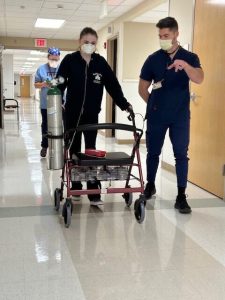
“I can sing in the shower again,” Jen says, smiling. “That’s like my proudest achievement right now, after surviving the surgery. I can knit without getting tired. I can talk on the phone with my family without panting. I can do the things that I love again.”
For those still waiting for a transplant or struggling with a chronic illness, Jen offers this advice:
“You never know what’s going to come around the corner,” says Jen. “A new CF drug just came out last week, it just popped up out of the blue. We don’t know what’s going to happen, so you’ve just got to hold on and hope that something good is just around the corner. Don’t give up. Just keep going.”
She’s endlessly grateful—to her parents, her medical team, and, most of all, her donor.
“People think that organ donation is a sad subject to talk about, but organ donation is the closest thing we have to magic,” says Jen. “It’s not like my donor is totally gone—their legacy lives on. Who wouldn’t want that? To keep being around, to keep being appreciated, and to keep being talked about.”
To help Jen out with out-of-pocket expenses, click here!
